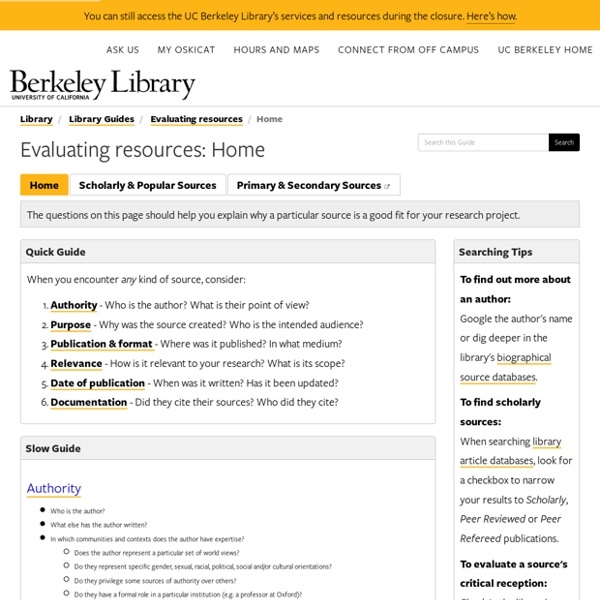Evaluate the quality and credibility of your sources
Not all information is created equal. Just because you find information at the library does not guarantee that it is accurate or good research. In an academic setting, being able to critically evaluate information is necessary in order to conduct quality research.
Smore Newsletters for Education
Edward Harris, Jr. Middle School Presenting databases and Sacramento Public Library homework support to our students and their parents at Parent University in SeptemberCelebrating Banned Book Week and promoting reading with studentsCollaborating with Sacramento Public Librarian, Elsie Mak Teaching students to use Google Drive and Noodle ToolsBook Tasting with Mr.
Evaluating Internet Research Sources
Robert Harris Version Date: January 21, 2015 Previous: December 27, 2013; November 6, 2013; Nov. 22, 2010 and June 15, 2007 "The central work of life is interpretation." --Proverb Introduction: The Diversity of Information Adopting a Skeptical Attitude
Website Evaluation Explained by Common Craft
Finding accurate and useful information on the Web can be frustrating. With so many websites, it’s difficult to know what is trustworthy and factual. To solve this problem, you need think like an editor.
Evaluating Internet Sources : Olson Library
Because of the hodge-podge of information on the Internet, it is very important you develop evaluation skills to assist you in identifying quality Web pages. There are six (6) criteria that should be applied when evaluating any Web site: authority, accuracy, objectivity, currency, coverage, and appearance. For each criteria, there are several questions to be asked. The more questions you can answer "yes", the more likely the Web site is one of quality.
Dog Island Free Forever - Press
We are proud to have been covered internationally even only in the first month of launch. If you work in the media, as a researcher, journalist or as a broadcast personality, please feel free to talk about our site and what we are doing. We would love to hear from you if you do. There is a press release that you can download here: Press Release in Word Format Press@TheDogIsland.com Print Village Voice, 4/16/2003
How To Cite Social Media Using MLA and APA
YouTube has progressed beyond cat videos. Twitter is more than just sharing what you’re eating for dinner. All of the major social networks are keystones of our online life and make up a big portion of who we are. So it’s no surprise that there are now guidelines on how to cite social media using the MLA and APA standards. In fact, I’m surprised it’s taken this long to see this topic hit the mainstream.
Evaluating Sources of Information
Summary: Evaluating sources of information is an important step in any research activity. This section provides information on evaluating bibliographic citations, aspects of evaluation, reading evaluation, print vs. online sources, and evaluating Internet sources. Contributors: Dana Lynn Driscoll, Allen BrizeeLast Edited: 2018-01-24 02:05:54 The world is full of information to be found—however, not all of it is valid, useful, or accurate. Evaluating sources of information that you are considering using in your writing is an important step in any research activity.
Truth, Lies, and the Internet
Truth, Lies and the Internet, a just-published report from the British think-tank Demos, shares that, despite their feelings of efficacy, young people are not careful, discerning users of the Internet. Researchers Jamie Bartlett and Carl Miller reviewed current literature and conducted an online survey of 509 primary and secondary school teachers in England and Wales regarding their assessment of students’ digital fluency. The authors define digital fluency as: the ability to find and critically evaluate online information.
Google Search Results: Evaluating What You Find
Google’s web-page-ranking system, PageRank, tends to give priority to better respected and trusted information. Well-respected sites link to other well-respected sites. This linking boosts the PageRank of high-quality sites.



